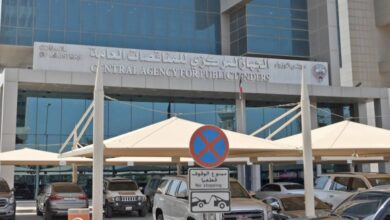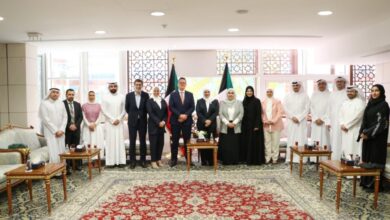Kuwait’s return to global markets, a strategic step toward sustainable growth, says Minister Al-Fassam

The State of Kuwait is steadily advancing toward a comprehensive economic vision rooted in sustainability, diversification, and innovation. At the heart of this vision is the goal of building a resilient, adaptable economy—one capable of withstanding global challenges and reducing reliance on oil as the primary source of national income, says Engineer Noura Suleiman Al-Fassam, Minister of Finance, Minister of State for Economic Affairs and Investment.
Amid accelerating regional and global economic transformations, Kuwait is enhancing its competitiveness through ambitious structural and legislative reforms. The country is expanding investment in strategic sectors such as infrastructure, education, and logistics—paving the way for a diversified, knowledge-based economy aligned with its long-term national vision, reports Al-Rai daily.
In this context, she said, Kuwait’s return to international borrowing markets marks a pivotal strategic milestone. It supports the country’s development objectives and establishes a solid foundation for a new phase of sustainable growth.
This move is consistent with Kuwait’s historical approach, which began in 1987, of using public debt instruments to maintain macroeconomic stability and stimulate growth.
The recently issued Decree-Law on Financing and Liquidity represents a major transformation—introducing the most comprehensive legal framework in Kuwait’s history for managing public debt. It provides for borrowing ceilings of up to KD 30 billion and maturities extending up to 50 years, the minister added.
Eng Al-Fassam went on to say, “This re-engagement with debt markets forms part of a broader strategic vision to strengthen Kuwait’s fiscal position and confidently reassert its presence in global financial circles with a clear, forward-looking economic agenda.
“The implementation of this borrowing strategy will be overseen by a tripartite public debt committee composed of senior representatives from the Ministry of Finance, the Central Bank of Kuwait, and the Kuwait Investment Authority. On May 25, 2025, these institutions were formally authorized to execute borrowing operations on behalf of the state.”
This committee is tasked with formulating Kuwait’s financing policy to ensure that all borrowing decisions align with the country’s long-term development goals. The strategy is designed to equip Kuwait to navigate global economic shifts and oil market volatility, ensuring a cautious and sustainable approach to capital markets, she said.
Eng Al-Fassam disclosed, Kuwait’s planned return to the debt market will involve a carefully structured issuance process aimed at bolstering financial stability and attracting both local and international investors. One key goal is the creation of a sovereign yield curve, which would serve as a vital benchmark for private sector issuances and help stimulate broader economic activity.
The funds raised through these sovereign issuances, she said, will be channeled into major development projects, especially those related to infrastructure. These include modernizing road and bridge networks, and building new hospitals and schools—initiatives that aim to enhance public service delivery and improve the quality of life for all residents.
Additionally, Kuwait is prioritizing large-scale investment in the logistics sector, particularly port infrastructure, to strengthen trade and position the country as a major regional logistics hub. These projects are designed not only to diversify the economy but also to generate high-quality employment opportunities for Kuwaiti youth and stimulate innovation.
In tandem with these efforts, the government is rolling out a comprehensive package of financial and economic reforms to increase operational efficiency and grow non-oil revenues.
These measures include revising the pricing of government services, regulating the pricing of state-owned lands and properties, and reevaluating the subsidy system.
These reforms, Eng Al-Fassam said, are being complemented by an evolving legislative environment, including key laws aimed at stimulating economic activity—such as the Government Sukuk Law, amendments to Law No. 126 of 2023 on combating the monopoly of vacant lands, and updates to Law No. 105 of 1980 governing state properties.
Together, these reforms form a critical component of Kuwait’s broader economic transformation strategy. They are intended to enhance the country’s readiness to re-engage with debt markets while safeguarding national assets, diversifying funding sources, and enabling proactive fiscal management, she added.
The minister went on to say, Kuwait’s return to the global financial stage sends a clear and confident message: the nation is fully committed to sustainable development, economic diversification, and building a secure and prosperous future for its citizens.
Through this comprehensive framework, Kuwait is laying the groundwork for long-term growth, robust infrastructure, and expanded opportunities for generations to come.














